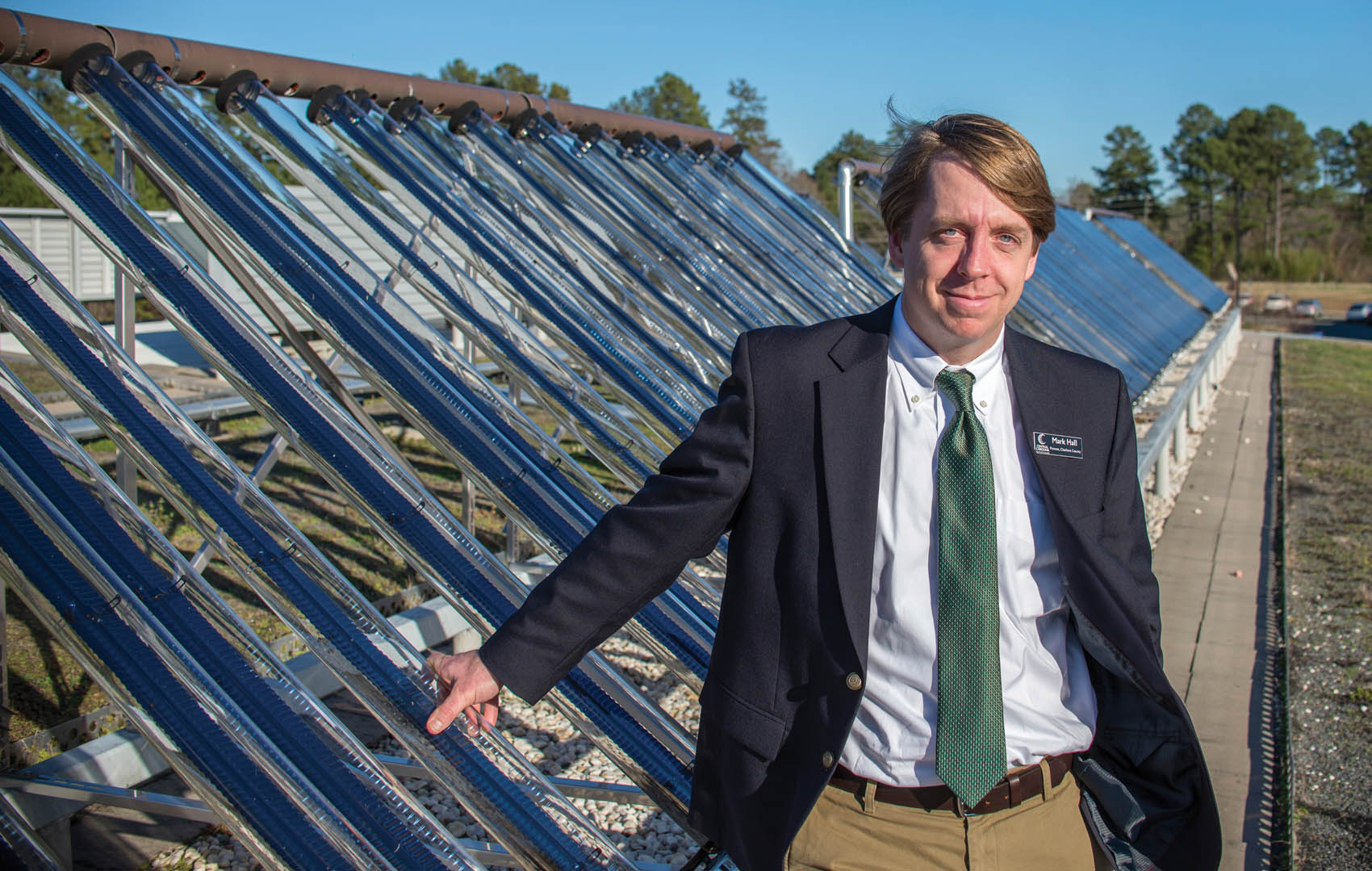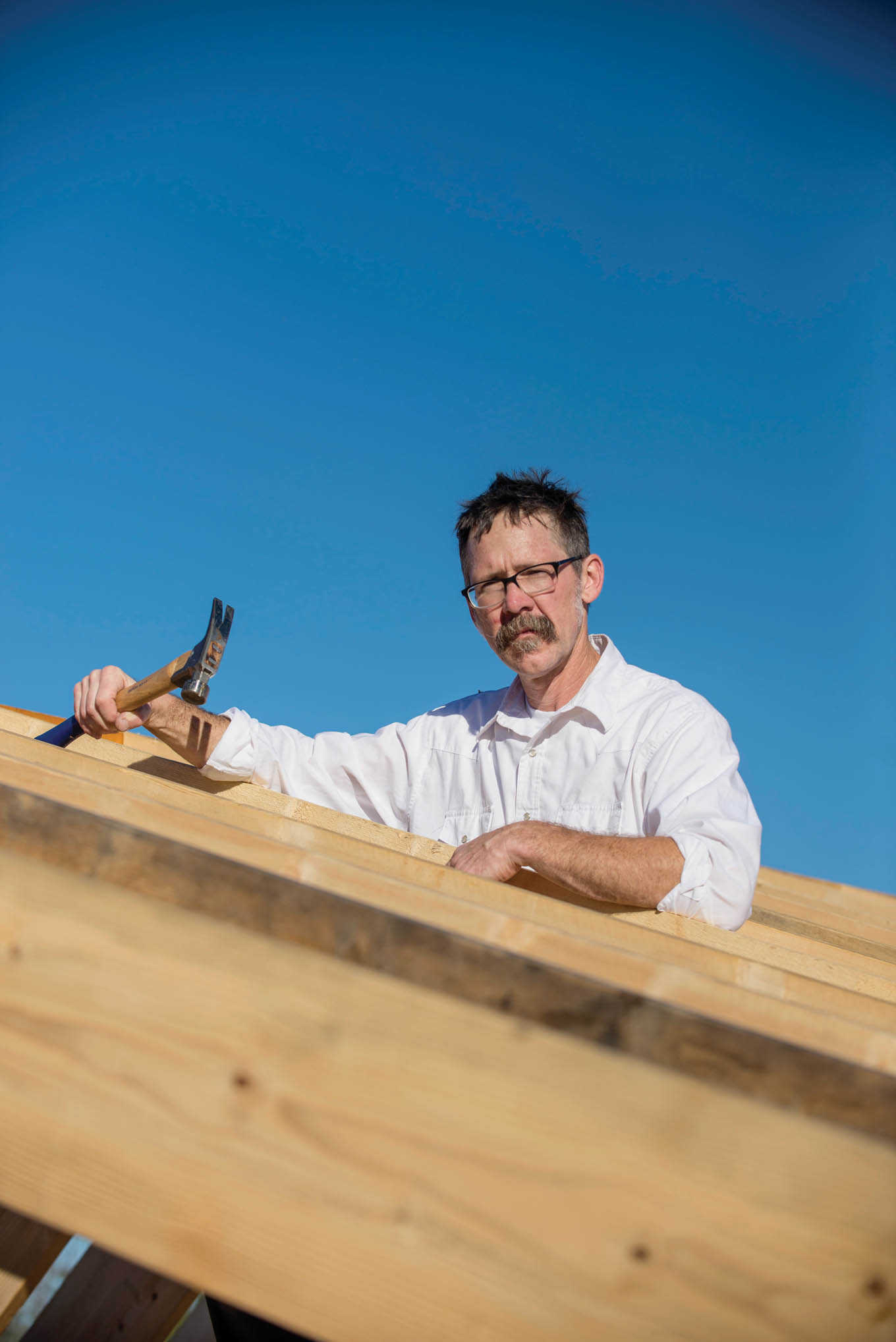
Photo courtesy of The Sanford Herald. Mark Hall, Central Carolina Community College's Chatham County Provost, stands next to solar tubes used to heat water on CCCC's Pittsboro Campus.

(Editor's note: This article first appeared in the 2016 Chatham Living magazine, a community publication of The Sanford Herald with the Chatham Chamber of Commerce and Chatham Economic Development Corp.)
By William "Chip" Pate, Chatham Living Magazine
PITTSBORO - Organic. Sustainable. Green.
However you want to describe it, environmental sensitivity is becoming more mainstream than ever before. Trendy, even.
That wasn't the case many years ago when Central Carolina Community College started going green on its Pittsboro campus. The college was way ahead of the curve and probably few at the time completely understood how much that direction would transform the college. Or even define it.
An emphasis on environmental responsibility made perfect sense in Chatham, a rural community leavened by artists, advocacy groups and small family farms -- some key early constituents of the movement from its inception.
Of course, what being "green" even means is up for interpretation. For CCCC, it rests on the notion of sustainability, which is yet another one of those slippery terms that can be tough to grasp. Broadly defined, it means to use something without destroying it. In other words, the way of doing business remains viable over the long haul - it can be sustained - without causing harm. Andrew McMahan, CCCC's building technologies chair, acknowledges that any practical definition is up for debate. But for the college, what it all boils down to is being good environmental stewards.
Apparently they've achieved success. Many have hailed CCCC as a pioneer in sustainability, and that includes the American Association of Community Colleges. Four years ago, the association presented CCCC its Green Genome Award, which honors community colleges nationwide that have been leaders in sustainability and the green economy. The college was recognized for best practices in sustainability program development and implementation.
"We do a really good job in what we're trying to do," says McMahan. "With sustainable programs, we're still talking about niche markets, there's no doubt about that. But the college is out in front."
Green In the Curriculum
CCCC began its journey in 2008, when the college launched an innovative biofuels degree, one of the first in the nation. During an era of higher gasoline prices and limited sources for crude oil, the idea was to tap into an emerging industry dedicated to turning corn, soybeans and other crops into a renewable source of fuel. Times have since changed and the economics have, too. With the entire industry struggling, the full curriculum is no longer offered, though the college does maintain a five-course certificate program. But that early foray into sustainability helped launch other academic programs that remain a vibrant part of the campus scene.
The college offers a program in Sustainable Technologies focused on alternative energy and green construction. There's another in Sustainable Agriculture designed to help farmers produce food that renews resources, rather than depletes them. Then there's a strong sustainability theme running through Culinary Arts and the Natural Chef Certification Program developed and offered in Pittsboro.
All three provide instruction emphasizing sustainability, but each goes one step further with some innovative project that demonstrates how those principles can be put into practice. CCCC was the first community college in the nation to have its own organic, sustainable farm -- a five-acre parcel on the Pittsboro campus that was ranked the 14th-best student farm in America last year by Best College Reviews, an online journal ranking college and university programs. The farm has forged a close relationship with Natural Chef Cafe, a farm-to-table restaurant located across campus and run by culinary students. Open twice a week during the semester, the cafe features locally grown foods prepared with sustainable practices.
For construction students, it's a project simply known as "the cottage," a tiny house constructed each year to give students hands-on training in sustainable technologies.
The cottage is an example of what McMahan calls "high-efficiency building." That construction version of sustainability involves constructing a traditional structure, but in a way that uses less material to build and requires less energy to operate, resulting in lower power bills over the life of the home. Students begin the cottage every fall and finish in time for it to be sold at auction during the summer. Jeff Gannon, who teaches green building at the college, says it gives his students a chance to stay on top of the latest industry trends in a rapidly evolving field.
"In our cottage, we're building it so it's solar panel friendly, since we don't know exactly where the cottage will end up. But the owner can plug into an off-grid system or an on-grid system. The design is such that the cooling loads are lighter and use less energy than a conventionally built cottage. So, we pay attention to the details.
"It doesn't always cost more to use these technologies, but by using them you can reap the benefits."
Green Across the College
Being green is not just an emphasis in a few degree and certificate programs; it's the way CCCC does business. When it was time to expand the Pittsboro campus and build a new library, college officials did something unusual and creative. Knowing that the county library also was running out of space and looking for somewhere to expand, the college agreed to a joint venture. The two were combined into the Chatham Community Library, a state-of-the-art, on-campus facility that contains more than 40,000 books, a full range of other media, 40 computers, independent study rooms and the list goes on.
Mark Hall, provost of CCCC's Chatham Campus, says the library clearly provides a wealth of expanded resources for students and county patrons, but the decision had plenty of environmental benefits as well. Most importantly, only one library needed to be built and its overall environmental footprint is much smaller than two libraries would have required, preserving both land and resources. To raise the ante, the college invested in some of those green building approaches that it teaches in the Sustainable Technologies curriculum.
The new library was angled to take advantage of natural sunlight and solar tubes on the roof collect energy that heats water used throughout the building. Rainwater is captured and wastewater is processed as "greywater," a nonpotable form of water that is reused to flush toilets and irrigate some of the campus grounds.
When a classroom building was needed for the Sustainable Technologies curriculum, it was a no-brainer to apply the same green principles once again, this time adding a vegetative roof to provide extra insulation and reduce stormwater runoff. Display monitors keep track of the building's operation. And even the furniture is green --made of recycled materials that are local, nontoxic and renewable.
As the college's emphasis on sustainability grew, the effort evolved into Green Central, a clearinghouse for information on sustainability courses, a continuing education program in ecotourism, various college projects and other environmentally-oriented initiatives.
Why is all of this so important? Hall notes that being green helps the bottom line with advantages like lower energy costs. And that's essential. But there's something more. "To some degree," he says, "it's just the right thing to do."
Green for the Future
Doing the right thing does have its benefits. The provost believes CCCC's dedication to sustainability has helped the college raise its visibility in a way that makes it easier to attract quality students, enhance its prestige and entice partner organizations like North Carolina State University and Abundance North Carolina, a sustainability nonprofit that holds an annual conference on the Pittsboro campus.
It also has enriched the community beyond the campus gates. Having a respected, local educational institution take a national leadership role in the green economy helps the county, as a whole, by making it more attractive as a destination for families and businesses. And, with businesses come jobs and greater opportunity.
Hall says the kind of green projects the college has pioneered over the years are no longer an emerging trend; they're becoming mainstream and people everywhere are looking for seasoned leaders and practical training in how to make it all work. That puts CCCC in a particularly strong position as the world catches up to the college.
Lyle Estill helped create that early biofuels program and, as founder of Piedmont Biofuels and author of several environmental books, remains a leading voice regionally in the sustainability movement. He believes the focus on being green has set Central Carolina Community College apart.
"CCCC was a pioneer in its sustainability practices," he says. "Its biofuels program was one of the first in the country and its timing on its library made it unique on the continent. I would say that it still leads when it comes to Natural Chef paired with student farm. And its green building program, which ships a tiny house every year, is also extremely rare.
"I think the emphasis on sustainability at Pittsboro's CCCC campus is a big draw for our community."
Chatham Living Magazine is a community publication of The Sanford Herald with the Chatham Chamber of Commerce and Chatham Economic Development Corp.

Photo courtesy of The Sanford Herald. Mark Hall, Central Carolina Community College's Chatham County Provost, stands next to solar tubes used to heat water on CCCC's Pittsboro Campus.

Photo courtesy of The Sanford Herald. Jeff Gannon is Central Carolina Community College Green Building Instructor.